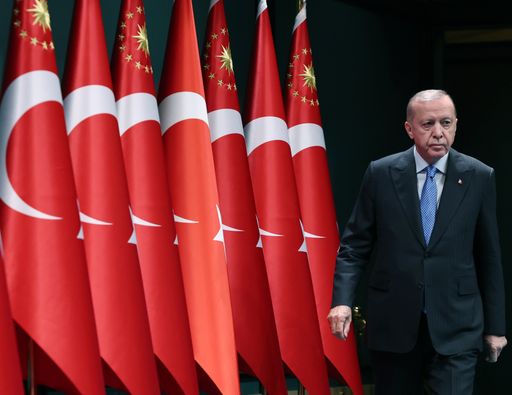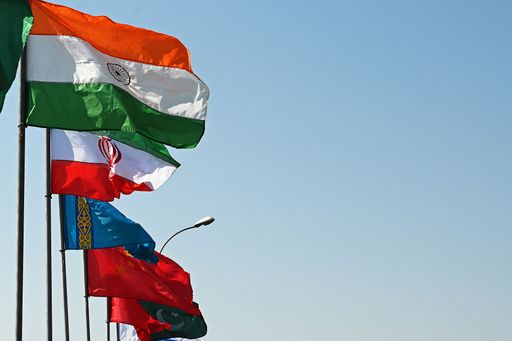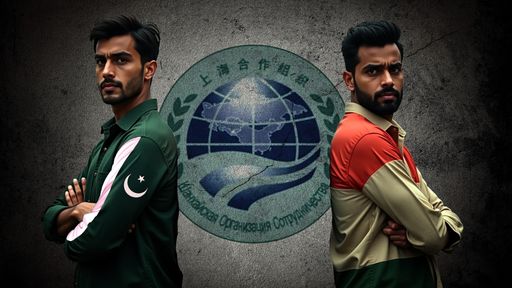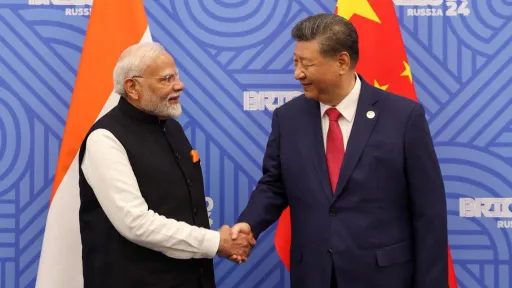The 25th Shanghai Cooperation Organization (SCO) Summit, set to be held in the northern Chinese port city of Tianjin from August 31 to September 1, is being billed as the Eurasian bloc’s most consequential gathering to date.
The summit gains significance amid uncertainties over Russia-Ukraine ceasefire talks and global geopolitical and trade upheaval triggered by US President Donald Trump’s policies in recent months, which have unsettled supply chains and pushed key countries closer to alternative multilateral platforms like the SCO.
Over the two days of the summit in Tianjin, Chinese President Xi Jinping will host more than 20 world leaders, including Turkish President Recep Tayyip Erdogan, Russian President Vladimir Putin, Indian Prime Minister Narendra Modi, Pakistani Prime Minister Shehbaz Sharif, Iranian President Masoud Pezeshkian, UN Secretary-General Antonio Guterres and a host of Central and Southeast Asian leaders.

For Beijing, the Tianjin summit is a stage to project the SCO as a platform of “true multilateralism,” in sharp contrast to what it sees as US-driven unilateralism and protectionism. Chinese officials have stressed that the summit will chart the organisation’s development blueprint for the next decade, embodied in the forthcoming “Tianjin Declaration.”
“This stands in sharp contrast with the Western sphere, where we see economic problems, transatlantic tensions, and strained relations with Russia,” remarked Kyrgyzstan’s former Prime Minister Djoomart Otorbaev.
“In comparison, the unification of Global South countries through the SCO is impressive. More and more countries are seeking membership. The whole world is watching this summit closely,” Otorbaev told TRT World. “As the largest member of the SCO, China hosting the event underscores what could be the organisation’s most important milestone in its 25-year history.”
Discussions in Tianjin are expected to cover security, renewable energy, digital technologies, and—potentially most significantly—the long-mooted SCO Development Bank, a new financial institution modelled in part on the BRICS’ New Development Bank (NDB).
“Finance ministers and central bank governors of SCO countries have clearly stated that such an institution is necessary,” Otorbaev, who has closely followed the SCO’s evolution, revealed in a phone conversation from the Kyrgyz capital Bishkek.
While speculation persists over whether the SCO bank will spearhead a de-dollarisation drive, Otorbaev expressed caution, suggesting that SCO member states may consider using the new bank to settle trade in national currencies but the dollar will remain important in the foreseeable future, “provided it is not used as a political weapon.”
Biggest summit: Under the shadow of trade protectionism
This year’s summit carries exceptional significance amid global uncertainties exacerbated by trade protectionism, according to Shen Shiwei, founder of the China Briefing newsletter and a non-resident fellow at Zhejiang Normal University.
“This will be the largest SCO Summit in its history, with more than 20 national leaders and 10 heads of international organisations attending,” Shen told TRT World from Tianjin.
“The summit aims to consolidate the SCO’s role as a stabilising force in an increasingly fragmented world, offering both security cooperation and economic integration as counterweights to unilateral tariff measures that disrupt supply chains,” he said, hinting at Trump’s tariff regime that has unsettled global trade.
The SCO has grown rapidly since its founding in 2001. Today, the SCO countries – including 10 full members, two observer states and 14 dialogue partners – represent more than 41 percent of the world’s population, over 34 percent of global GDP (PPP), and about 24 percent of world’s land area.
“One of the defining features of the SCO today is its focus on pragmatic development, sustainability and building trust, which can collectively facilitate regional connectivity, mobilisation of people and resources, and synergy,” according to Zoon Ahmed Khan, a Pakistani research fellow at the Beijing-based Center for China and Globalization (CCG).
“Apart from this, the SCO also stands as a representation of an increasingly multipolar world that rejects hegemony, zero-sum mentality, and moralism,” Khan told TRT World.
She added that in light of Trump’s tariffs and a new wave of divisive policies from the Global North, the SCO “provides much-needed alternatives vis-à-vis development, trade, and overall economic stability… sending a strong message of unity amidst diversity, showcasing itself as cooperative rather than coercive, offering certainty at a time when the US seems to be burning bridges.”

Three pillars: Security, economy, and digital transformation
The agenda for this year's summit centres on three pillars: security, economic connectivity, and digital transformation. “Leaders will address both traditional threats, such as terrorism and new challenges like cybersecurity and biosafety. Economically, the focus will be on trade facilitation and synergy with the Belt and Road Initiative to improve connectivity across transport corridors,” noted Shen.
The Tianjin Declaration, expected to be the summit’s central outcome, will set the SCO’s priorities for the next decade. The last SCO Development Strategy was adopted at the summit in Ufa, Russia, in 2015. “The new strategy will update priorities to reflect today’s challenges, including economic fragmentation, security risks, and technological shifts. In addition, more than 20 documents and decisions are expected to be signed, setting both short- and long-term goals for cooperation,” Shen elaborated.
Khan emphasised that on the diplomatic front, this summit may offer solutions to address outlying regional challenges, including trust deficits among member states. “Addressing the status and situation in Afghanistan – which has an observer status within the SCO – also remains high on the agenda, and it’s possible that members will arrive at stronger commitments on this front.”

Conflict resolution: Need for a viable mechanism
The timing of the summit underscores its political weight. It comes amid escalating trade wars triggered by Trump’s disruptive policies, renewed conflict in the Middle East, and deepening rifts between Russia and the West.
The SCO is also unique in bringing together countries often at odds — such as India and Pakistan as full members, Armenia and Azerbaijan as dialogue partners, and Cambodia and Thailand, with the former as a dialogue partner and the latter represented through ASEAN as a guest attendee. Still, the Eurasian group has drawn criticism for shying away from directly mediating conflicts.
“The recent India-Pakistan conflict was a sobering moment for the organisation,” noted Otorbaev. “The SCO sought to play a role, but as a relatively young body, it still lacks well-established mechanisms to address such acute crises, even though security and counterterrorism remain central to its agenda,” he explained.
Shen Shiwei emphasised the institutional context. “The SCO’s conflict-resolution role is limited by its founding principles: non-interference in internal affairs and consensus-based decision-making, known as the Shanghai Spirit.”
Khan added that bilateral conflicts and escalations impact the SCO’s potential: “There have been discussions on a possible role in conflict resolution. Whereas no such commitment has been made, it is in the broader interests of the organisation to shift its approach.”
Recently, SCO defence ministers met to discuss sensitive issues, which is a step in the right direction, according to Otorbaev. “The fact that both Armenia and Azerbaijan have applied for full membership shows that countries see value in joining—whether for economic cooperation, currency diversification, sustainable development, or security.”
Khan, meanwhile, highlighted the establishment of the International Organisation of Mediation (IOMed) in Hong Kong by the Chinese government earlier this year, calling it “an opportunity for the SCO to refer peripheral disputes to a trusted international body.”
Beyond security: Trade, tech and disaster management
While the SCO was initially conceived as a security bloc, its agenda has steadily broadened. The Tianjin Declaration is expected to prioritise renewable energy, digital technologies, and artificial intelligence. According to Otorbaev, the declaration could also pave the way for “establishing centres for development of artificial intelligence, 5G and high-performance computing.”
Economic integration is also central. Trade between China and other SCO states topped $512 billion in 2024, and Beijing’s investment stock in fellow members now exceeds $84 billion. The SCO is positioning itself as both a trade bloc and a technology alliance, with members eager to reduce vulnerability to Western sanctions and supply chain disruptions.
Khan highlighted the SCO’s growing relevance in human security and climate resilience, pointing to the recent devastating floods in India and Pakistan. “These floods show how interconnected we are and that borders cannot shield us from natural disasters. The ‘Shanghai Spirit’ emphasises that threats are collective, requiring joint action,” she said, underlining the relevance of the SCO in regional disaster management efforts.
The Beijing-based Pakistani geopolitical analyst added that the SCO can mobilise resources and coordinate regional efforts, with UN Sustainable Development Goals (SDGs) and economic and human security already central to its agenda. “Unity and a collective response to such crises is the best way forward. The SCO is the only platform shared by India and Pakistan that can enable this,” she noted.

Potential RIC trilateral reset: A seismic shift
The Tianjin summit also offers the possibility of reviving the Russia-India-China (RIC) trilateral format, once a key pillar of Eurasian diplomacy. Modi’s visit is his first to China in seven years, signalling cautious re-engagement despite lingering border tensions.
Otorbaev sees Washington’s pressure on New Delhi over its import of Russian oil as inadvertently driving India closer to Eurasian partners, including Russia and China. “President Trump is making everything possible to strengthen the SCO,” he argued. “By bullying and introducing unfair trade policies, those countries are naturally looking for new partnerships. For India, the logical path is Eurasia.”
While Russia, India and China share grievances with Washington, cohesion remains fragile, with historical tensions – particularly between India and China – still casting a shadow.
Shen offered a measured take: “I cannot confirm whether such a meeting will be arranged among the three leaders on the sidelines of the Tianjin Summit,” but he underscored the broader strategic logic of closer India–China–Russia coordination in response to global uncertainties.
“India has learned that the US is an unreliable partner, that it’s foolish to be an outpost for US hegemony in Asia, that this only undermines Indian security and development prospects,” said Josef Gregory Mahoney, an American professor of politics at East China Normal University
“While a trilateral meeting between China, Russia and India in Tianjin remains uncertain, it’s not unimaginable, and this alone marks a seismic shift from two years ago,” he told TRT World.



















